Congratulations! You or your child want to learn a stringed instrument (aka violin, viola, cello, bass). Finding a good teacher is the first and one of the most important steps you will take but now especially with the internet, there are a flood of options to choose from! Consider this your guide for narrowing in on the right choice for you.
- Online vs face to face/in-person
- Online tutorials
- Private instructors
- Certification programs
- Pre-college and preparatory programs
- Teacher/Student Compatibility
Online vs. face to face instruction
Pros of Online Instruction:
- Remote access
- Access to specific teachers who don’t live in your community
- More flexible schedules
Cons of Online Instruction:
- Camera angles can make it hard to catch poor technique
- Poor sound quality or internet connection can make it hard to get good feedback on your sound
- More difficult to establish a personal student-teacher relationship
Pros of face to face instruction:
- Allows more opportunities to connect with your local music community
- Allows for the development of personal student-teacher relationships
- Encourages accountability and seriousness when you are responsible to show up in person
Cons of face to face instruction:
- Not everyone has access to face to face teaching opportunities
- Generally less flexible schedule
Online tutorials
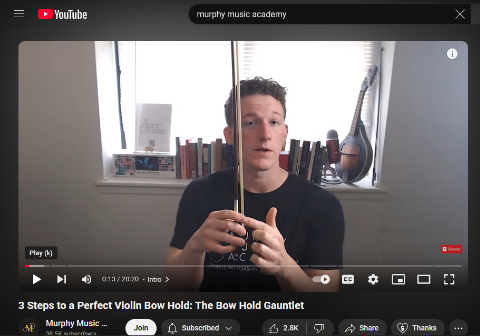
As a teacher of more than a decade, my thought on online tutorials is that they can be very useful especially when used along with regular lessons where you can get live feedback on your playing. I have encouraged my students to listen to and read tutorials because it provides other perspectives on technique and repertoire which they might find helpful. But even though you may get lots of good information from online tutorials, live feedback from an experienced teacher cannot really be replaced by a Youtube video.
Here are some I recommend:
- Murphy Music Academy (YouTube)
- Violinmasterclass.com
- Augustin Hadelich (YouTube)
- TwoSet Violin (YouTube)
- Ray Chen (YouTube)
- Violin Lab (YouTube)
- Price Violin Academy
Private instructors
Private instructors are a great option when looking for a good string teacher. They often teach from home studios, but can also be found as the owners or teachers in small private music schools. Their skills range from beginners-only to all levels including advanced coaching.
There are several ways to connect with private instructors:
- Ask around your personal circle of friends and family for recommendations
- Ask if musicians in your local orchestra or music club give lessons
- Look up teachers on social media or websites like Superprof (https://www.superprof.com/lessons/violin/united-states/)
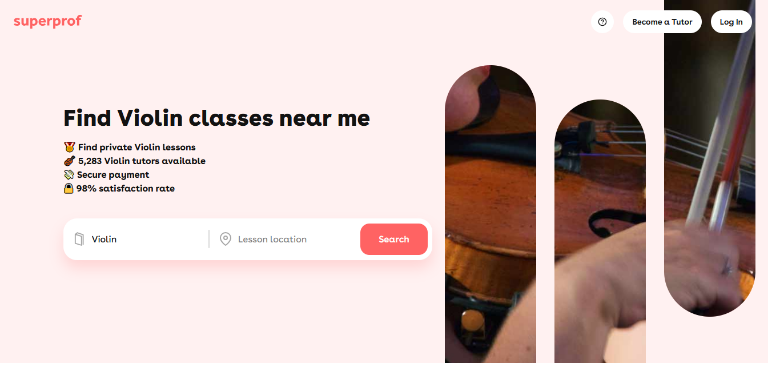
Choose your instrument and then enter your zip code. The website then connects you with teachers in your local area.
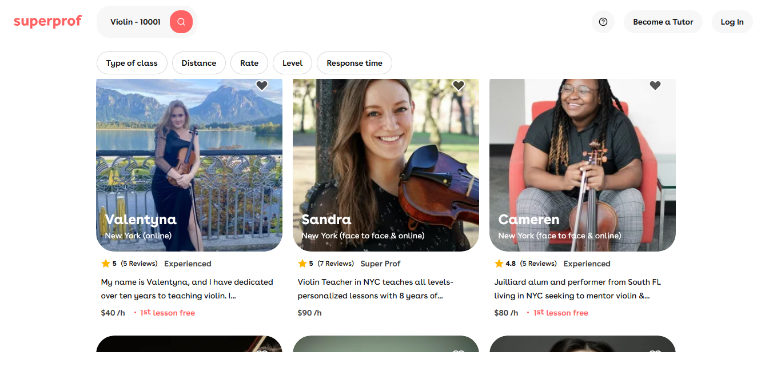
Whether on SuperProf or on Facebook or Google, read reviews and profiles to find a teacher that might suit your needs. Many teachers offer a free first lesson which is a great way to find out if you will be able to work together well. Someone could be a great teacher but if your personalities clash or there is something that feels uncomfortable, it may not be a good fit. You should keep looking.
Certification Programs
Certification programs are definitely something to be aware of when searching for a string teacher. It is not necessary for a teacher to be a part of national, state, or local programs to provide good instructions, but being a part of these programs can provide good opportunities to perform, get feedback from other teachers, and find a sense of community. Programs can also be a good way to connect with a teacher. Check out a few of the best-known national programs below.
ASTA
The American String Teachers Association (ASTA) is one of the best known certification programs in the United States. “The ASTA Certificate Advancement Program (ASTACAP) aims to establish clear objectives and recognition to students of all levels. Students are assessed at specific levels of technical and musical readiness through non-competitive examinations by examiners of musical and pedagogical stature, receiving certificates for each level completed.” (https://www.astastrings.org/site/astacap)
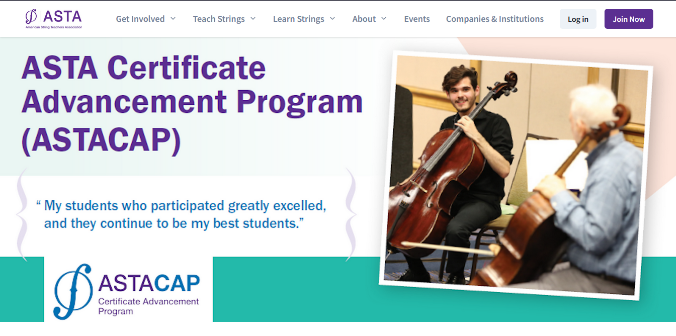
Suzuki Association of the Americas
The now world-acclaimed Suzuki Method of teaching musical instruments was established in Japan by Dr. Shinichi Suzuki. If taught how Dr. Suzuki originally envisioned, it is a purely rote method of teaching instruments. However, not all teachers who use the Suzuki method books adhere to all the teaching practices. There is not a problem with this, but if you are looking for true Suzuki instruction, check out the search feature on their web site to find Suzuki certified teachers in your area. (https://suzukiassociation.org/parents/find-a-suzuki-teacher/)
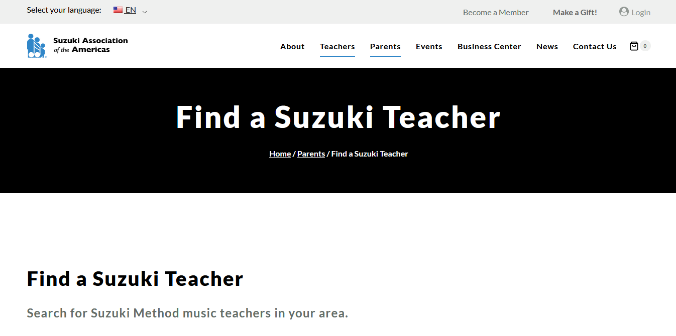
Bornoff Foundation (FASE)
Programs like the Bornoff Foundation offer both certification programs for teachers, provide resources, and help support community music programs. They state the following about their certified teachers: “Candidates earn certification by passing performance, teaching, and reflection tasks for each level consecutively. Certification represents an endorsement of the candidate’s performance and teaching quality, as well as its alignment with Bornoff and FASE’s vision for improved student outcomes and greater equity, agency, and creativity in strings.” (https://fase.org/teacher-training/certification/)
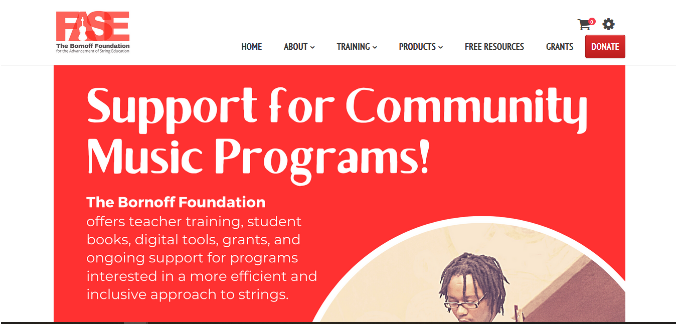
National String Project Consortium
This program is not actually a certification program but rather provides the opportunity to college musicians to teach under the supervision of experienced instructors. College musicians benefit from the experience and their students benefit from quality instruction at an affordable price. Check out their directory to see if you live near one of their dozens of projects. (https://www.stringprojects.org/locations/)
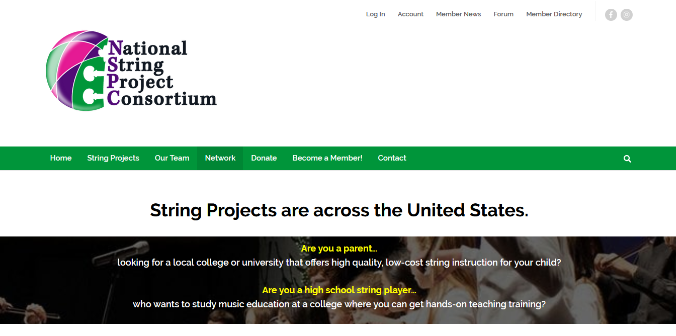
Preparatory programs
One of the best opportunities for finding a good string teacher are pre-college and preparatory programs operated by well-known music schools. These programs provide instruction from beginners through intermediate and often into high school and college level training. They are very demanding and/or require a serious financial commitment and for that reason are a better choice for the very serious student.
- Juilliard Pre-College Division (New York, NY): Students ages 8-18, one of the most prestigious music programs in the world
- The Juilliard School’s Music Advancement Program (New York, NY): After-school program for beginner to intermediate students from underrepresented communities, ages 8-13. Juilliard’s MAP is particularly well-regarded for giving talented youth a pathway to music education at a young age.
- Eastman Community Music School (Rochester, NY): Focus on young learners, but will take beginners of all ages, an extension of the Eastman School of Music
- University of Southern California Thornton School of Music’s Music Prep Program (Los Angeles, CA): Preparatory program for children and beginners operating under the direction of the Thorton School’s excellent faculty
- San Francisco Conservatory of Music Pre-College Program (San Francisco, CA): Pre-college program for beginners through advanced students
- Indiana University Jacobs School of Music – Pre-College Program (Bloomington, IN): Pre-college program for beginner and intermediate string students.
- New England Conservatory (Boston, MA) – Preparatory School: Comprehensive preparatory program for young beginners and intermediate students..
- The Colburn School – Pre-College Program (Los Angeles, CA): Pre-college division for students aged 5 to 18. The program is highly competitive, attracting some of the most talented young musicians in the U.S.
- Cleveland Institute of Music (Cleveland, OH) – Preparatory Program: Preparatory program for children and beginners.
- Manhattan School of Music Precollege Division (New York, NY): Pre-college program for students starting string instruments. MSM has a strong reputation for preparing students for future professional music education.
Teacher/Student Compatibility
Compatibility between the teacher and student should not be overlooked as you search for a good teacher. Someone could be very a very skilled player and instructor, but if they are not the right fit for you or your child, lessons can be challenging. People learn in different ways and an instructor should try to figure out how to best connect with the needs of each student. That being said, you should give a teacher a number of lessons before deciding they are not a good fit. Also, consider having a candid conversation about the struggle you or your child is having in the learning process and see if your feedback can give the teacher information to work from to make things more understandable. If the teacher is unwilling to have that conversation, consider amicably parting ways.
Another thing to consider is when you might need to transition to different teacher because you have exhausted what your current teacher can help you with. For most beginners this will not happen for quite some time, but will probably happen at some point for most serious students. I had five different teachers over the course of about twenty years and each one was an important contributor to different stages of learning. Any really good teacher will recognize when you might need to move on to someone more experienced than they are, and should be open to a conversation about it. If you are part of a program, this is often built in to the system and may not be an issue, but if you are with a private instructor, it is always something to keep in mind.
Summary
There are so many resources available today for any level of string player. Some learning opportunities require more time or financial commitment, some are more oriented towards hobby players, and some focus on a particular style of learning. Whether you are able to find a connection in your local area by word of mouth or online or you choose to seek out a larger program, finding a good string teacher has never been easier.
